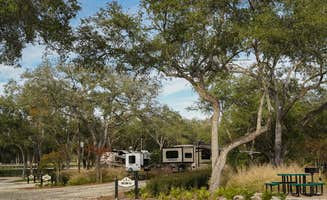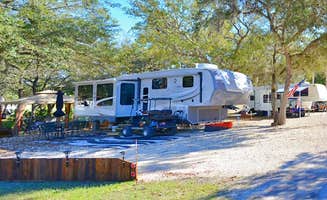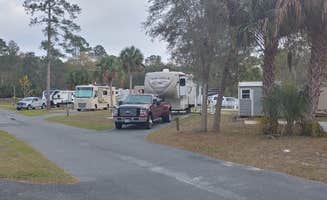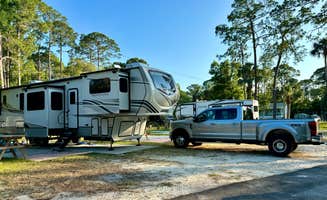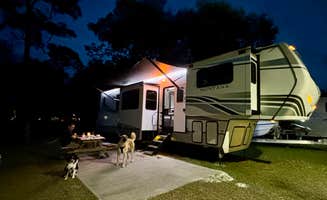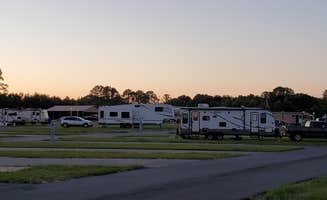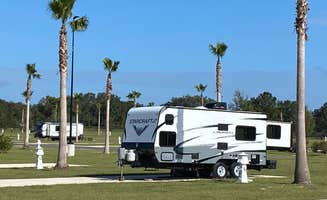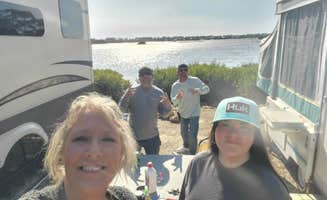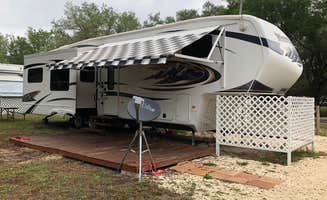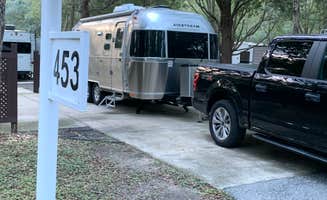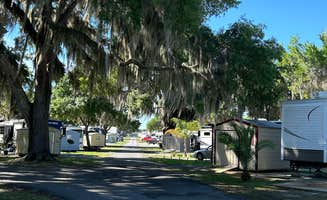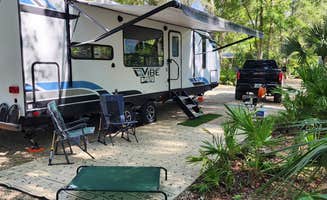Gulf Hammock, Florida sits within the low-lying coastal region of Levy County where the elevation typically ranges between 10-20 feet above sea level. The area experiences a humid subtropical climate with mild winters and hot, wet summers where temperatures often exceed 90°F between June and September. Camping conditions remain favorable year-round, though summer humidity can be intense with frequent afternoon thunderstorms.
What to do
Manatee viewing opportunities: Crystal River's waters offer some of Florida's best manatee encounters. At Encore Crystal Isles, campers can access nearby manatee habitats. "Close to Three Sisters Springs where you can kayak with the Manatees," notes Sonya A., highlighting the popular winter activity when manatees seek warmer waters.
Fishing excursions: The Gulf Hammock region provides diverse fishing options from freshwater springs to coastal areas. "Beach is 5miles down the road. Good fishing areas and boat rentals outside park," explains Joseph L. about Crystal Isles, pointing to the accessibility of both shoreline and boat fishing opportunities.
Natural springs exploration: The area features numerous springs with crystal clear water. At Hart Springs Park, visitors can enjoy the spring-fed swimming area. "The springs here are gorgeous and the swimming area is large. We came in the winter and it was a bit cold to swim, but there are plenty of boardwalks around the rec side of the park to tour the sights," shares Jessica C.
What campers like
Spacious campsites: Many rv parks near Gulf Hammock feature well-designed sites. "Sites are easy to back in and we was almost level where we put our camper. It seems pretty quiet in the evenings and everyone is very friendly that we have seen," Sam L. mentions about Hart Springs Park.
Clean facilities: Campground cleanliness consistently earns positive reviews. At Cedar Key RV Resort, campers appreciate the well-maintained amenities. "Super clean and quiet. This campground has it all except a childrens play area. Laundry, pool, clubhouse, Pickleball courts," notes Wendy T.
Natural surroundings: The wooded settings provide shade and wildlife viewing. "One of the best camp grounds in Florida, large sites and beautiful springs to swim in!" Terry S. says of Hart Springs Park. The combination of natural features and camping comforts makes these destinations popular among campers seeking Florida camping experiences.
What you should know
Seasonal variations: Weather and crowds fluctuate throughout the year. "We have been for years, our number one location for summer birthdays. Our favorite time to visit is the off season with cold nights warm days and the least bugs," Bri F. shares about Hart Springs Park, highlighting how seasonal timing affects the camping experience.
Cell service reliability: Connectivity varies significantly by carrier and location. At Williston Crossings RV Resort, reliable service supports remote work. "Sites are large and level. Hookups are well located and organized. Amenities include a large heated pool, hot tub, grist mill and activities," notes Phil, mentioning the infrastructural reliability.
Site selection matters: Not all sites offer equal amenities or surroundings. "Great spot with amenities and close to everything we want to do. Just make sure you don't get a site along the road," advises Kelly D. about Rock Crusher Canyon, suggesting that location within campgrounds affects noise levels and experience quality.
Tips for camping with families
Pool access for kids: Several campgrounds maintain swimming facilities beyond natural springs. At Rock Crusher Canyon RV Park, families find recreational options. "Park has nice facilities, including a rec room, heated pool, and spa. Staff very pleasant and rate was great," Michael M. reports, noting the family-friendly amenities.
Playground availability: Family-focused campgrounds offer designated play areas. "Great campground! New. Facilities are up to date and clean. Sites are decent and paved. Wish there were trees for some shade. Owners are terrific!" mentions Amber H. about Strawberry Fields for RV'ers.
Bike-friendly environments: Several campgrounds feature paved roads ideal for children learning to ride. "Great for biking and a great bike path nearby that we used often. Manatee springs is close and Cedar Key is a welcome getaway," Mary H. notes about Strawberry Fields, highlighting the recreational opportunities beyond camping.
Tips from RVers
Level site considerations: RV campers emphasize the importance of level sites. "Very nice park. Full hookups, bathrooms, showers, pool, hottub, tennis, lots of kids stuff. The sites have fire pits and tables," mentions a reviewer about Crystal Isles, detailing the amenities important to comfortable RV camping.
Laundry facilities: Long-term RVers particularly value on-site laundry. "The park is very tropical, lush, and landscaping is really pretty. They have a great pool, hot tub, clubhouse area. Some RV sites are a challenge to get into, some are larger," Laura H. explains about Crystal Isles.
Seasonal booking strategy: Advanced reservations become essential during winter months when Gulf Hammock RV parks fill with snowbirds. "We decided last minute to do some camping and they were very nice in the office. There are showers, bathrooms, tent camping, rv camping, canoe launching, and even a pool," Crystal D. mentions, suggesting that last-minute accommodations may be possible during off-peak times.


